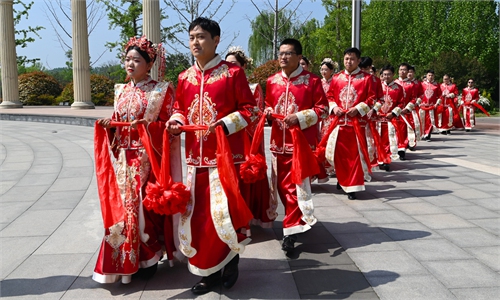‘520’ remains popular marriage registration date
China’s marriage-age population base staying stable

A couple get their marriage license on May 20, 2023 in the civil affairs bureau in Yuncheng, North China's Shanxi Province. Photo: VCG
The number of marriage registrations on May 20 this year made headlines over the weekend, despite declines in a few places compared with last year. The number of couples getting married will remain stable in the coming years, based on the huge population base in China, a Chinese demographic expert said.
May 20 has become a popular date for marriage registration among Chinese young people, as "520" is pronounced like "I love you" in Chinese, boosting sales of related products and services such as wedding banquets, roses and hotel bookings.
Many Chinese newlyweds reportedly lined up overnight outside marriage registration offices to tie the knot, according to media reports.
Including Beijing, Shanghai and South China's Guangdong Province, local civil affairs bureaus in multiple places on Sunday announced the number of marriages on Saturday.
A total of 4,087 couples registered their marriages in Beijing, 2,097 couples tied the knot in Shanghai, 16,000 couples married in Southwest China's Sichuan Province and 11,156 couples were registered in East China's Jiangsu Province, along with 7,155 couples in Southwest China's Yunnan Province, 6,873 couples in Southwest China's Guizhou, 6,270 couples in East China's Fujian Province, 1,195 couples in Northwest China's Qinghai Province, and as many as 12,450 couples in Guangdong.
Experts pointed out that the number of marriage registrations on a specific day can be affected by multiple factors such as the connotation of the date, the population base of young people of marriageable age and people's general willingness to get married.
According to the National Bureau of Statistics and the Ministry of Civil Affairs, the number of marriages is declining but will still remain stable in the next few years, with a major turning point after 2035, Song Jian, a demographer from the Center for Population and Development Studies of the Renmin University of China, told the Global Times on Sunday.
China's population base of marriage-age people will remain stable in the next few years, Song said. Although the rate of young people being unwilling to marry is on the rise, the proportion of people who never marry remains below 10 percent.
"Statistics show that most Chinese people will eventually get married, but they are just putting off marriage," Song said.
Compared with last year, marriage registrations in several places, including Jiangsu, Guangdong, Sichuan and Fujian fell sharply this year, which Song noted may be a result of the COVID-19 epidemic, which obstructed personnel flows and communication over the past two years, but the number on a specific date does not mean an overall decline of people getting married.
Although May 20 this year fell on Saturday, some civil affairs authorities announced to work 48 hours non-stop over the weekend , considering that most couples would like to choose an auspicious date to get married, since May 21, the traditional Chinese solar term Xiaoman (grain buds), was also an auspicious date according to the Chinese lunar calendar.
A staffer from the marriage registration office of the civil affairs department in Rencheng district in Jining noted that the number of couples who got married over the weekend reached 400 as of Sunday afternoon, an obvious increase from 250 on May 20 last year.
"Many newlyweds gave us a thumbs-up for our service and sacrifice, and we feel honored to satisfy those young people with our service and promote young people's willingness to get married," the staffer told the Global Times on Sunday.
China's State Council approved the expansion of an inter-provincial marriage registration pilot program to 21 provincial-level regions across the country last week, a latest move to promote long-term and balanced population development, which is particularly appreciated by the migrant population, who no longer need to return to their hometowns to register their marriages.
In the province of Guangdong, 1,813 couples have accomplished their inter-provincial marriage registration soon after the pilot program was approved.
In Dong'ao village in Fujian, the place on the Chinese mainland closest to the island of Taiwan, 21 couples from Fujian and Taiwan participated a group wedding ceremony on Saturday, which is expected to promote cross-Straits affection and people-to-people exchanges through their small families.



